The Australian National University has launched a $10 million Zero-Carbon Energy for the Asia-Pacific research initiative that intends to build a body of research and knowledge it hopes will re-position Australia as a major exporter of renewable energy to the Asia Pacific region.
In launching the project, the ANU has recognised that Australia’s resources heavy export industry, particularly one that is overly reliant on fossil fuel exports, is vulnerable to a global transition away from coal and gas.
The ANU estimates that by 2035, the Asia-Pacific region will account for around two-thirds of the world’s energy demand. Additionally, Australia’s energy exports currently account for around 10% of global trade in fossil-fuel based emissions, placing Australia in a powerful position to influence the global flow of emissions-intensive resources, for good and for bad.
Mirroring the ANU’s thinking, recent analysis published by the Australian-German Energy Transition Hub, highlighted the kinds of opportunities that could be open to Australia if it actively perused the production and export of excess renewable energy production.
Like others, it suggests Australia has huge potential to export renewables, and noting that being able to produce 200 per cent renewables – or more – would boost Australia’s own grid and its energy exports.
“In a rapidly decarbonising world, Australia needs to transform from exporting fossil fuels to exporting renewables,” head of the ANU’s Energy Change Institute Professor Ken Baldwin said.
“Iron ore and coal are our two biggest exports. But changes are already underway in the Asia-Pacific region and Australia will not be able to rely on traditional fossil fuel exports indefinitely.”
“This project will help Australia contribute to this challenge. It will show how we can harness our abundant renewable energy to ensure we remain an energy export powerhouse.”
Recognising Australia’s access to immense resources of renewable energy sources, the ANU believes that renewables may be crucial to a healthy Australian export industry, and is seeking to provide the knowledge base to make it happen.
The research project will draw upon expertise across multiple disciplines present at the ANU, including social, environmental, economic and technological research. The project forms part of ANU’s series of “Grand Challenge” research initiatives, and will seek to reshape Australia’s approach to global trade based on greater use of renewable energy sources.
The Zero-Carbon Energy for the Asia-Pacific will consist of five areas of priority research, including: renewable electricity systems, hydrogen fuels, renewable refining of metal ores, energy policy and governance and indigenous community engagement.
ANU researchers believe a pivot towards an export sector focused on renewable energy would be a win-win scenario; it would “future proof” Australia’s economic prospects, while also helping to reduce global greenhouse gas emissions.
“This could reduce global carbon emissions by the equivalent of more than three times Australia’s domestic emissions, as well as provide sustainable growth and development opportunities for Australia,” Baldwin added.
ANU Vice Chancellor Professor Brian Schmidt believes that the ANU is well placed to draw upon the academic expertise present at the ANU to drive a meaningful shift in the way Australia views its export industries into the future.
“We have world-class expertise in energy, the Asia-Pacific and Indigenous policy. This project combines this unrivalled expertise with ambition and vision. It will deliver targeted social, environmental, economic and technological outcomes with real impact,” Schmidt said.
“The ANU Zero-Carbon Energy for the Asia-Pacific project is a powerful example of how energy change will transform Australia’s economy and exports for the better, while delivering major benefits for our nation, our region and the world.”
The research initiative was launched with Federal energy Minister Angus Taylor in Canberra, representing a rare foray by the minister in getting behind a project that specifically aims to reduce global emissions and boost clean energy alternatives to fossil fuels.
More recently, Taylor – who has said there is already too much wind and solar in the grid – has been declaring the need for coal generators to stay open and “run at full tilt”, and also on Thursday accused major utilities of bowing to demands of green activists in shutting down coal generators.
It is also a contrast to the Federal government’s most recent interactions with neighbours in the Pacific region, after the Morrison government left Pacific island leaders perplexed by Australia’s lack of willingness to agree to climate action at the Pacific Island Forum in August.
Australia worked to undermine efforts of Pacific Island leaders to develop an ambitious statement committing to climate action, and worked to water down the language on phasing out fossil fuel use in the communique released by the forum.
Pacific Island leaders, including Tuvalu’s Prime Minister Enele Sopoaga, accused Australian Prime Minister Scott Morrison of prioritising Australian economic interests ahead of addressing the existential threats faced by Pacific nations vulnerable to climate change.
Australia’s international advocacy for the coal industry has also resulted in Australian diplomats being frozen out of the upcoming United Nations climate summit, set to be held in New York next week.










